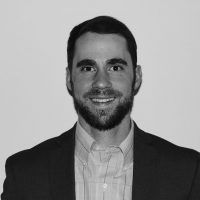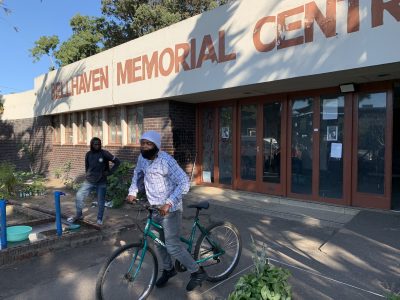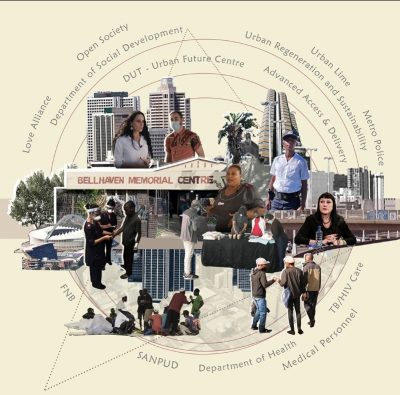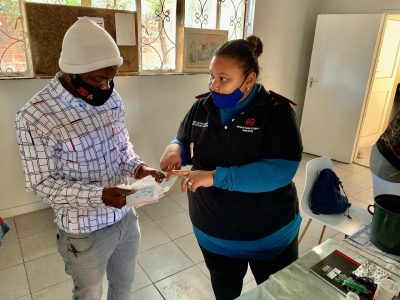Community partnership provides harm reduction for vulnerable populations in Durban
October 22, 2021

Michael Wilson
Michael Wilson, MPH, cofounded Bellhaven Harm Reduction Centre, the first low-threshold harm-reduction center in South Africa which provides community-based health and harm reduction services for low-income and homeless individuals in Durban, South Africa. A recent mini documentary chronicles the unique relationship between the city, nongovernmental organizations (NGOs) and the local university that made this center possible.
In March of 2020, the eThekwini Municipality of Durban, led by then Deputy Mayor Belinda Scott, created 12 safe-sleeping spaces for the homeless to be protected from contracting COVID-19, and to prevent them from spreading it to others. These sites provided food, shelter and medical care to more than 2,500 people experiencing homelessness across the city, thanks in part to the work of Wilson, who earned a Master of Public Health degree from the UNC Gillings School of Global Public Health in 2014 and currently serves as an adjunct professor in the School’s Department of Health Behavior. He cofounded Advance Access & Delivery (AA&D) in 2015, a global health NGO headquartered in Durham, North Carolina, focused on building strong systems of health care delivery for the most vulnerable communities.
“I started my public health career in 2008, working at a federally qualified health center in Richmond, Va.,” said Wilson. “More than 90% of our clients were homeless, and many self-medicated with substances to cope with past trauma and neglect.”

Bellhaven Harm Reduction Centre
The roots of Bellhaven Harm Reduction Center date back to 2018, when Wilson and Monique Marks, PhD, who heads the Urban Futures Centre at the Durban University of Technology (DUT), began dialogue with the city around the creation of a state-of-the-art harm-reduction center. In March, 2020, Wilson and Marks were brought in by Durban’s deputy mayor to introduce a withdrawal management program into the city’s safe sleeping spaces to address the traumatic and painful withdrawal hundreds were experiencing due to forced removal from drug supply as a result of the mandatory lockdown. The program provided evidence-based medical and psychosocial interventions, in line with a harm-reduction approach. This involved leading a team of private medical and psychosocial professionals in providing short-term opioid substitution therapy medication (in this instance, methadone) to 260 homeless people in the lockdown safe spaces, seven days a week. As previously covered on the UNC Gillings website, AA&D helped coordinate services for people with tuberculosis and noncommunicable diseases at these sites. The team noticed that providing these services side-by-side increased their effectiveness, benefitting pandemic-control measures and adherence to treatment. Providing safe opioid substitution therapy also allowed the homeless population to adhere to lockdown regulations.
This demonstration of success led Wilson, along with Marks, and Shaun Shelly, MPhil, chair of the South African Network of People Who Use Drugs, to establish the harm-reduction center, which serves approximately 200 people daily. The center provides psychosocial support alongside methadone treatment with a quality of care that is in line with World Health Organization guidance. The project was recently featured in a documentary created by the South African Cities Network, as part of its “Good Hood Stories” series, which highlights stories from cities across the country. The documentary, which has been selected for screening at the Better Cities Film Festival in Detroit, Mich., explores the context and the unique partnership with the City of Durban for establishing this harm-reduction center and its effects so far.

The South African Cities Network created this photo collage featuring Bellhaven.
Although substance use disorder is a major issue in South African cities, one that cuts across all sections of society, many have viewed it as excessively taboo or difficult to deal with. This project represents a unique collaboration between government and nongovernment entities; the city provides the building, water, electricity and security, and a group of NGOs and the university oversee the clinical and psychosocial services.
“Drug use is something that affects all communities and the health of communities,” said Wilson. “It is not another public health issue to tackle or to stamp out, but rather one that requires public health experts, city planners, policy makers, community members, religious leaders and business owners to lean in, to see the individuals that have been affected by a one-size-fits-all approach.”

Peer support at the Bellhaven Harm Reduction Centre
Bellhaven has transformed a building that was previously vacant and run-down into a vibrant, fully operational community harm reduction center. Along with clean drinking water, it also serves as a platform for delivering care for people at risk for tuberculosis, HIV, hepatitis and other chronic diseases, providing regular screenings and a place where people can collect their medications. It relies on the collaborative work of multiple institutions coming together to provide treatment and support to one of the neediest groups in our community.
“I believe that Bellhaven shows the type of transformation possible when a city goes from a punitive approach to one that supports people who use drugs and experience homelessness and the impact it can have on almost all sectors of society,” said Wilson. “My hope is that the Bellhaven model will be taken to cities around the world and that it will be used as advocacy tool that counters the narrative of drug users as a group to be written off by cities or communities as criminal or problematic, but rather one that recognizes drug users as humans, with a stories to tell and futures ahead.”
Contact the UNC Gillings School of Global Public Health communications team at sphcomm@unc.edu.
